

Handful of Biologists Went Rogue and Published Directly to Internet. Photo On Feb. 29, Carol Greider of Johns Hopkins University became the third Nobel Prize laureate biologist in a month to do something long considered taboo among biomedical researchers: She posted a report of her recent discoveries to a publicly accessible website, bioRxiv, before submitting it to a scholarly journal to review for “official’’ publication.
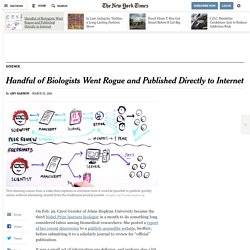
It was a small act of information age defiance, and perhaps also a bit of a throwback, somewhat analogous to Stephen King’s 2000 self-publishing an e-book or Radiohead’s 2007 release of a download-only record without a label. To commemorate it, she tweeted the website’s confirmation under the hashtag #ASAPbio, a newly coined rallying cry of a cadre of biologists who say they want to speed science by making a key change in the way it is published. Continue reading the main story Continue reading the main story Continue reading the main story Continue reading the main story Continue reading the main story Continue reading the main story. Meet the Robin Hood of Science. The tale of how one researcher has made nearly every scientific paper ever published available for free to anyone, anywhere in the world.
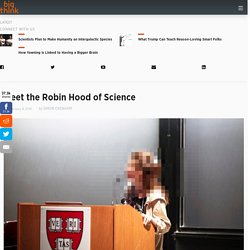
On the evening of November 9th, 1989, the Cold War came to a dramatic end with the fall of the Berlin Wall. Four years ago another wall began to crumble, a wall that arguably has as much impact on the world as the wall that divided East and West Germany. The wall in question is the network of paywalls that cuts off tens of thousands of students and researchers around the world, at institutions that can’t afford expensive journal subscriptions, from accessing scientific research.
On September 5th, 2011, Alexandra Elbakyan, a researcher from Kazakhstan, created Sci-Hub, a website that bypasses journal paywalls, illegally providing access to nearly every scientific paper ever published immediately to anyone who wants it. This was a game changer. Open Access Week. How I Published My Scholarly Book With an Open Access CC-BY License.
[Open Access Week in 2014 is October 20-26.]
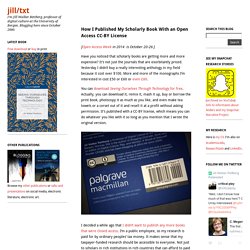
Have you noticed that scholarly books are getting more and more expensive? It’s not just the journals that are exorbitantly priced. Yesterday I didn’t buy a really interesting anthology in my field because it cost over $100. More and more of the monographs I’m interested in cost £50 or £60 or even £80. John Oliver Goes Off On An Epic, Fact-Checked, Mic-Dropping Rant For 13 Minutes That You Need To See. Net Neutrality 101. When we log onto the Internet, we take lots of things for granted.

We assume that we'll be able to access whatever Web site we want, whenever we want to go there. We assume that we can use any feature we like -- watching online video, listening to podcasts, searching, e-mailing and instant messaging -- anytime we choose. We assume that we can attach devices like wireless routers, game controllers or extra hard drives to make our online experience better. What makes all these assumptions possible is "Network Neutrality," the guiding principle that preserves the free and open Internet. Net Neutrality means that Internet service providers may not discriminate between different kinds of content and applications online.
The biggest cable and telephone companies would like to charge money for smooth access to Web sites, speed to run applications, and permission to plug in devices. The network owners say they want a "tiered" Internet. El niño que quería un Internet libre. El Abogado Lawrence Lessig y Aaron Swartz charlando en un intermedio de las reuniones sobre Creative Commons Había una vez… Aaron Swartz cuando cumplió los 8 años descubrió Internet, pasó horas leyendo y leyendo información y pensó que era ¡genial!
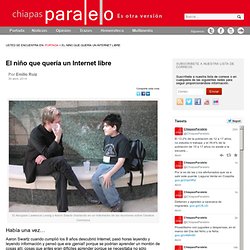
Porque se podrían aprender un montón de cosas allí, cosas que antes eran difíciles aprender porque se necesitaba no sólo comprar los libros sino saber qué libros comprar. www.lse.ac.uk/media@lse/documents/MPP/LSE-MPP-Policy-Brief-9-Copyright-and-Creation.pdf. Home. Defending your rights in the digital world. 8,200+ Strong, Researchers Band Together To Force Science Journals To Open Access. Evolutionary biologist Michael Eisen made this t-shirt design in support of the Elsevier boycott.
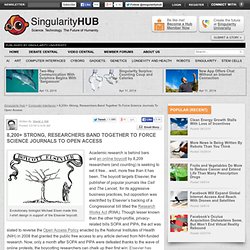
Academic research is behind bars and an online boycott by 8,209 researchers (and counting) is seeking to set it free…well, more free than it has been. The boycott targets Elsevier, the publisher of popular journals like Cell and The Lancet, for its aggressive business practices, but opposition was electrified by Elsevier’s backing of a Congressional bill titled the Research Works Act (RWA). Though lesser known than the other high-profile, privacy-related bills SOPA and PIPA, the act was slated to reverse the Open Access Policy enacted by the National Institutes of Health (NIH) in 2008 that granted the public free access to any article derived from NIH-funded research. But the fight for open access is just getting started. Seem dramatic? The FNF – Free Information, Free Culture, Free Society. Weapons of Mouse Destruction. The Internet Defense League - Protecting the Free Internet since 2012.
F2C2012: Aaron Swartz keynote - "How we stopped SOPA" Full text of "Guerilla Open Access Manifesto" Guerilla Open Access Manifesto Information is power.
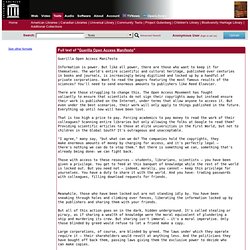
But like all power, there are those who want to keep it for themselves. The world's entire scientific and cultural heritage, published over centuries in books and journals, is increasingly being digitized and locked up by a handful of private corporations. Take Action – Google. Access. How the ITU could put the Internet behind closed doors.